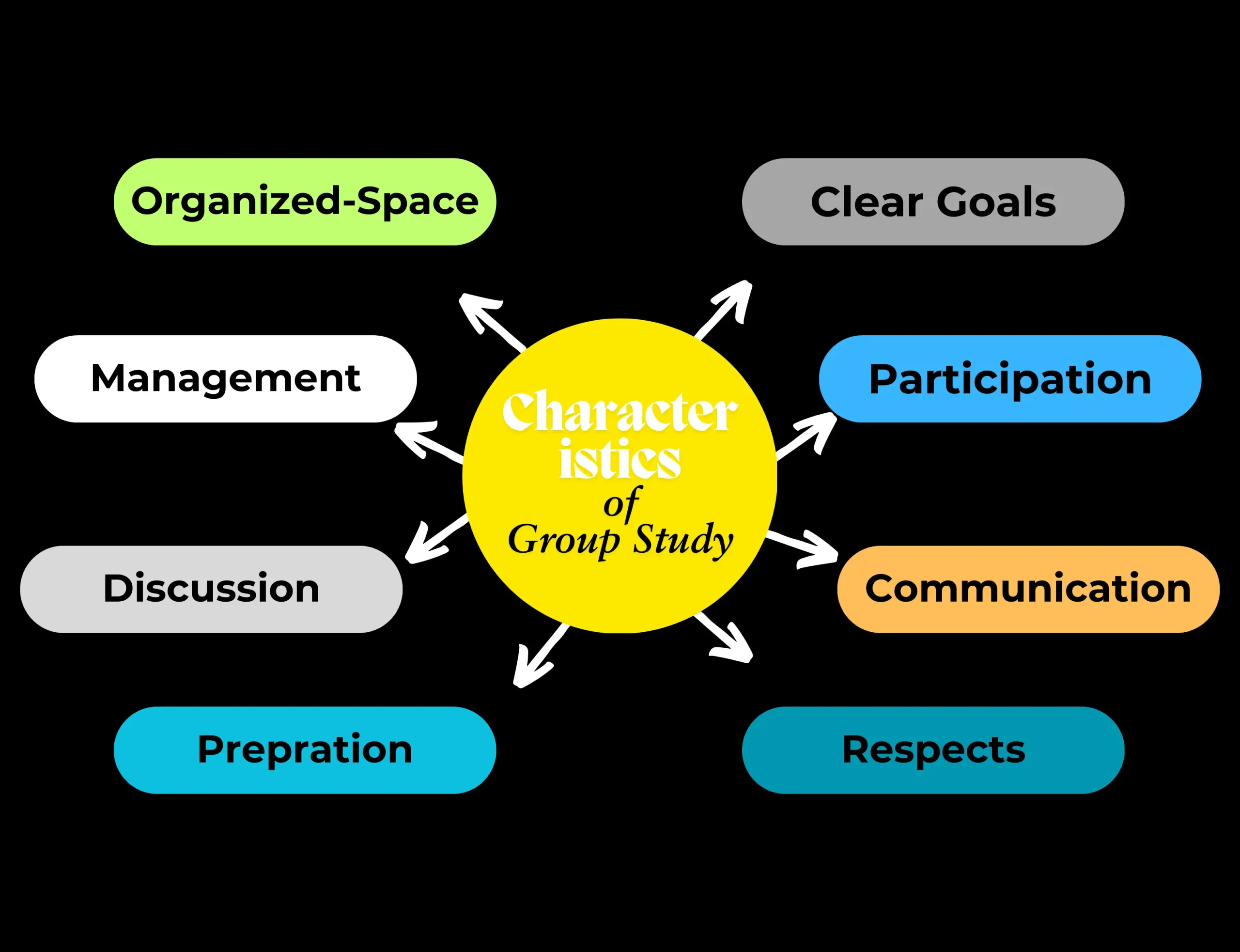10 Benefits of Group Study You Can’t Miss for Better Learning

It’s another long study session, and you’re staring blankly at your books, feeling stuck and unmotivated. Studying alone can be frustrating and overwhelming, especially when you hit a difficult topic or lose focus.
What if there was a better way? Imagine learning with like-minded peers, sharing ideas, and tackling tough concepts together. Group study isn’t just about sitting with friends; it’s about turning study time into a productive and engaging experience.
Curious how it works? Let’s explore the key benefits, characteristics, and tips for forming a successful study group that can transform the way you learn.
How to form a study group?
Forming a group study requires proper planning and coordination. Furthermore, there are many factors that contribute to its success. The group study may or may not achieve the desired results. Forming a group study effectively involves a structured approach and collective effort. Here are some key points that should be followed while forming a group study

1. Identify Goals and Subjects
To form an effective study group, start by identifying your shared academic goals and the subjects you want to focus on. This ensures that all members are on the same page and the sessions remain productive. Aligning interests helps avoid distractions and keeps the group motivated to achieve common milestones.
2. Select Group Members Wisely
Choosing the right group members is essential for success. Look for classmates who share a similar level of commitment, focus, and enthusiasm for studies. A well-chosen group can maintain a productive environment where everyone contributes and supports one another.
3. Create a Study Schedule
Develop a consistent and realistic study schedule that works for everyone. A well-planned timetable helps manage time effectively and keeps the group on track. Regular sessions, whether weekly or daily, ensure that topics are covered progressively and efficiently.
4. Assign Roles and Responsibilities
Distribute roles and responsibilities among group members to enhance accountability and productivity. Tasks like note-taking, moderating discussions, and organizing materials can be assigned to different individuals. This encourages participation and ensures everyone plays an active role in the group’s success.
5. Set Clear Rules and Expectations
Establish clear rules and expectations to maintain discipline and focus during group sessions. Agree on guidelines regarding punctuality, distractions, and session agendas. Having a shared understanding helps prevent conflicts and allows the group to achieve collective goals effectively.

Our Tools
What are the Benefits of Group Study?
The top 10 advantages of group study are:
1. Enhanced Understanding
Group study significantly improves understanding by encouraging knowledge sharing and collaborative learning. When students explain concepts to one another, it reinforces their own understanding while clarifying doubts for their peers. This method helps address complex topics that may otherwise be difficult to grasp alone. The diversity of thought within a group ensures that concepts are explored from various angles, leading to deeper comprehension.
Moreover, group discussions allow for problem-solving approaches that individuals might not have considered on their own. Students benefit from each other’s strengths, whether in analytical thinking or subject-specific expertise. The collaborative environment motivates individuals to engage more actively and critically, improving overall academic performance.
2. Improved Motivation
Group study creates a sense of accountability and commitment as students work toward shared academic goals. The mutual encouragement and support within a group foster motivation, making it easier to stay on track. Healthy competition pushes individuals to perform better while also creating a sense of teamwork and belonging. Knowing that others rely on your contribution adds an extra layer of responsibility, driving consistent effort.
The group dynamic often results in constructive feedback, which helps identify strengths and weaknesses. This collaborative spirit boosts morale, reduces feelings of isolation, and encourages students to approach their studies with a positive attitude. The group’s collective achievements often inspire greater individual commitment.

3. Better Critical Thinking
Debates and discussions within a study group stimulate critical thinking by exposing students to diverse perspectives. Group study encourages participants to challenge assumptions, ask questions, and explore concepts more deeply. This practice sharpens logical reasoning skills, helping individuals analyze and approach problems systematically.
The process of evaluating different viewpoints fosters creativity and broadens understanding. Students develop the ability to articulate their ideas clearly, question existing solutions, and think outside the box. Such skills not only aid academic learning but also prepare students for real-world problem-solving scenarios.

4. Eliminates Procrastination
One of the key advantages of group study is that it combats procrastination. When students study alone, distractions and laziness can often lead to postponing tasks. In a group setting, regular meetings and discussions create a sense of responsibility and urgency, motivating students to stay focused and prepared.
By committing to group sessions, students maintain consistency in their study routine. The pressure of being accountable to peers minimizes delays, ensuring steady progress. Group study, therefore, instills discipline and reduces the likelihood of last-minute cramming, making learning more productive.
5. Faster Learning
Group study facilitates faster learning as it combines the collective strengths of all members. Students bring unique knowledge, study techniques, and problem-solving approaches to the table, helping the group grasp concepts more efficiently. Explaining ideas and revisiting topics through discussions further strengthens understanding.
Moreover, group study allows members to divide topics and pool resources like notes and study guides, saving time and effort. This collaborative approach ensures that even challenging subjects are covered thoroughly and quickly, providing better academic outcomes in less time.
6. Improved Communication Skills
Regular interactions during group study sessions play a key role in enhancing communication skills. Students learn to articulate their ideas clearly, listen actively, and engage in meaningful discussions. These skills are essential for both academic success and future professional endeavors.
Debating concepts, presenting viewpoints, and answering questions during group sessions improve confidence and fluency in communication. Students also develop interpersonal skills like empathy and respect for differing opinions, preparing them for effective collaboration in team-based environments.
7. Strengthened Problem-Solving Skills
Group study enhances problem-solving abilities by promoting collective brainstorming. When faced with challenging questions or topics, students discuss multiple strategies and approaches, eventually finding the most effective solution. This collaborative process encourages critical thinking and analytical reasoning.
Hearing diverse viewpoints and methods helps students develop flexible problem-solving skills that can be applied to real-life situations. Group study also teaches patience and teamwork, which are essential for overcoming challenges both academically and professionally.

8. Diverse Perspectives
One of the most valuable advantages of group study is gaining access to diverse perspectives. Each group member brings a unique way of thinking, which enriches discussions and broadens understanding. By exploring different viewpoints, students can identify new approaches to solving problems and understanding concepts.
This diversity in thought helps break the monotony of self-study and encourages creative thinking. By listening to others, students develop a flexible mindset, learning to appreciate alternative solutions and adapt them to their own study strategies.
9. Resource Sharing
Group study promotes efficiency by encouraging the sharing of resources like notes, textbooks, and study materials. When students pool their knowledge and tools, they save time and effort, ensuring that all members benefit from valuable resources. This collaborative approach improves productivity and helps fill gaps in learning.
Additionally, resource sharing fosters a culture of trust and support within the group. Students feel more confident knowing they have access to reliable study materials and peers who can guide them through challenging topics.
10. Reduces Stress
Studying in groups helps reduce exam-related stress by creating a supportive and relaxed atmosphere. Sharing doubts and concerns with peers alleviates pressure and builds confidence. The camaraderie in group study sessions makes learning enjoyable, turning study time into a productive yet stress-free experience.
With a shared workload and mutual encouragement, students feel less overwhelmed. The motivation and reassurance provided by peers help students approach exams with greater confidence, improving both their mental well-being and academic performance.
What are the Characteristics of a Successful Study Group?
A successfull study group should have following characterstics:
- Clear Goals: The group should have well-defined objectives and study targets to stay on track.
- Active Participation: Every member should contribute to discussions and share their ideas freely.
- Open Communication: Members must communicate openly, ask questions, and clarify doubts without hesitation.
- Respectful Environment: Mutual respect ensures everyone’s opinions are valued, fostering a positive learning space.
- Prepared Members: All participants should come prepared to maximize productivity and knowledge exchange.
- Focused Discussions: The group must stay on topic and avoid unnecessary distractions during study sessions.
- Good Time Management: Efficient use of time with a planned schedule helps cover all study goals effectively.
- Organized Study Space: A distraction-free, organized environment promotes better focus and group collaboration.

Stop, while group study have lot of benefits, there are some disadvantages of group study as well.
Final Words
Group study offers a unique and effective way to learn, combining shared knowledge, teamwork, and motivation to achieve academic success. It not only helps you grasp concepts better but also builds essential skills like communication, time management, and problem-solving.
By forming a focused and organized study group, you can make learning more engaging and productive. So, gather your peers, set clear goals, and take the first step toward transforming your study sessions into a rewarding experience. Happy studying!
Want more content like this?
Get articles & insights direct to your inbox.
